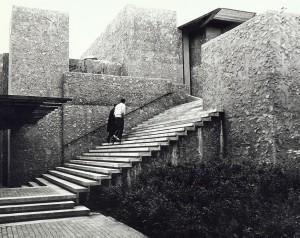SAD ENDS

Trent University
Ron Thom (1923-1986) is not a name any longer familiar to many, but in the 1960s he was one of Canada’s leading architects, second only to his fellow Vancouverite, Arthur Erickson. Like Erickson, Thom started small, designing prize-wining houses in a woodsy, modernist style that became associated with the West Coast. Like Erickson, he had difficulty translating his exquisite personal designs into the world of large, corporate commissions, and the arc of both architect’s careers contains more tragedy than triumph. Nevertheless, Thom produced at least two masterpieces of collegiate architecture, Massey College (1963) in Toronto and Trent University (1963-79). Both are unusual in being inspired by Frank Lloyd Wright, at a time when most people consigned the master’s work to the dusty shelf of history. They are doubly unusual in looking back to the young Wright of Midway Gardens and the Imperial Hotel. Perhaps it was Thom’s lack of formal training (he went to art school and studied painting) that enabled him to find something fresh in these 50-year-old buildings. Sadly, his later work did not fulfill the promise of these masterworks. Like Louis Sullivan, Thom died young (Thom was 63, Sulivan 68) of alcoholism.
Sullivan and Thom’s sad ends are exceptions in the world of architects. According to Vasari, Raphael, who died at only 37, succumbed to excessive love-making, which is a bitter-sweet end. Usually, when architects die before their time they do so thanks to disease (Richardson, Mendelsohn, Kahn, Saarinen, Stirling). Violent ends are rare: the great Gaudí was killed by a streetcar, Stanford White was murdered by a jealous husband. Most architects have lived long lives, productive until the end (I wrote about this in Slate). I was once told of a Viennese architect who comitted suicide when a prominent government building he built was discovered to have no stairs. But surely that is an apocryphal story. Wikipedia lists only nineteen “architects who committed suicide,” although the only widely recognizable name is that of the great Borromini, who suffered from depression.
Witold Rybczynski's Blog
- Witold Rybczynski's profile
- 176 followers



